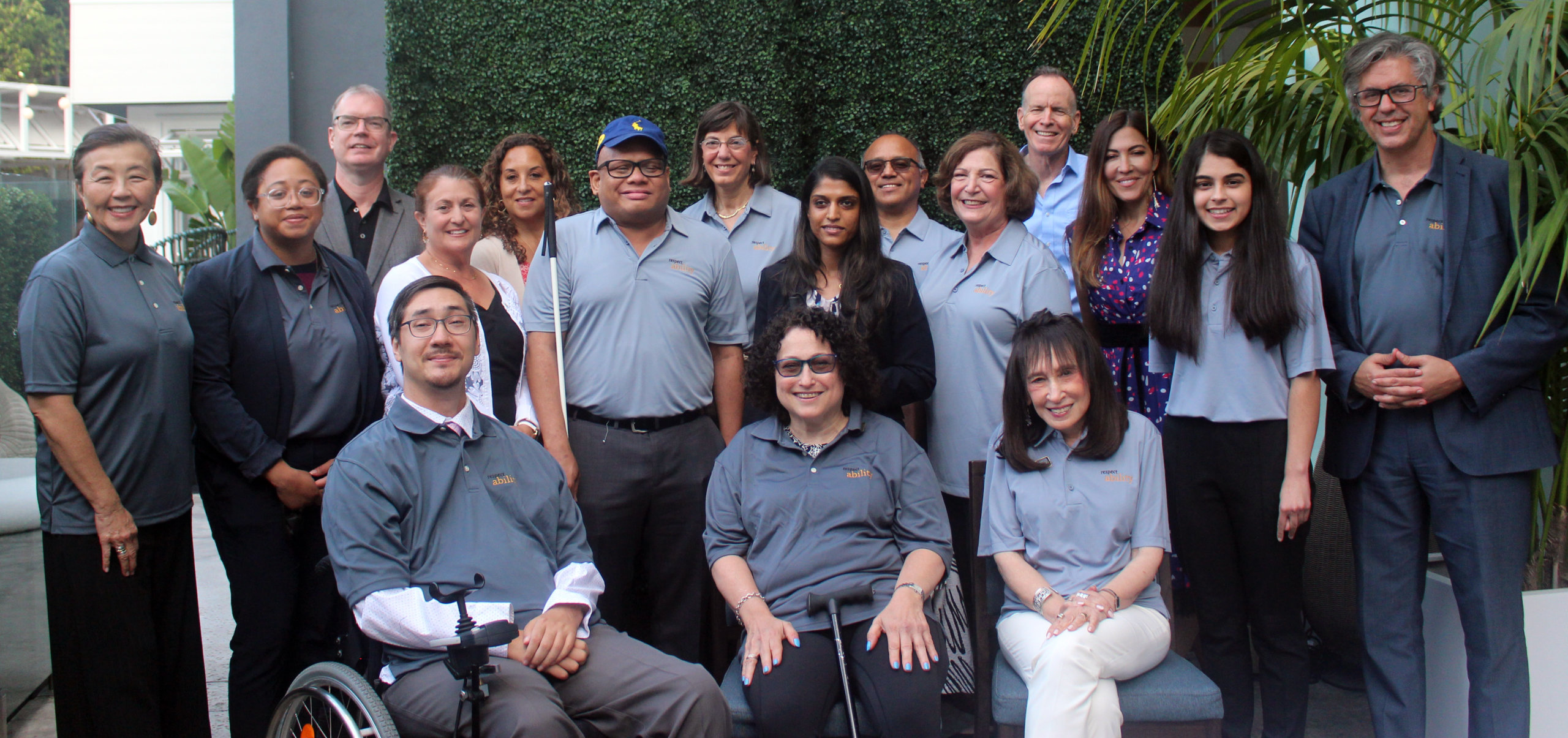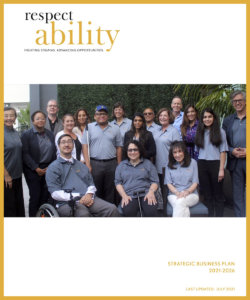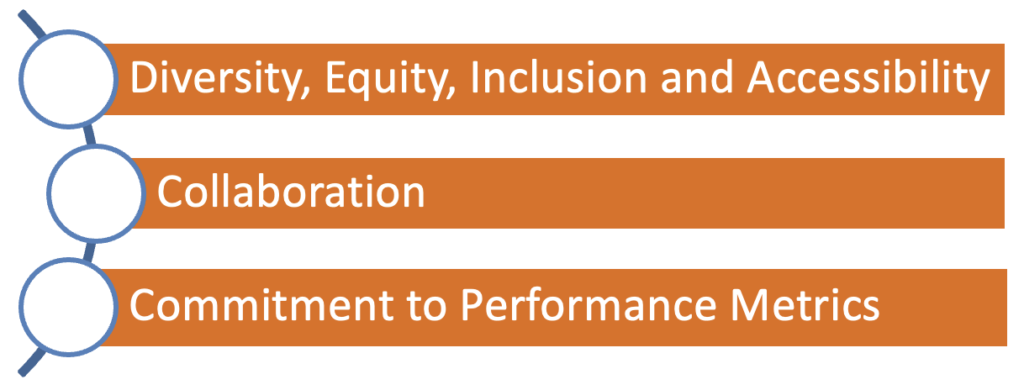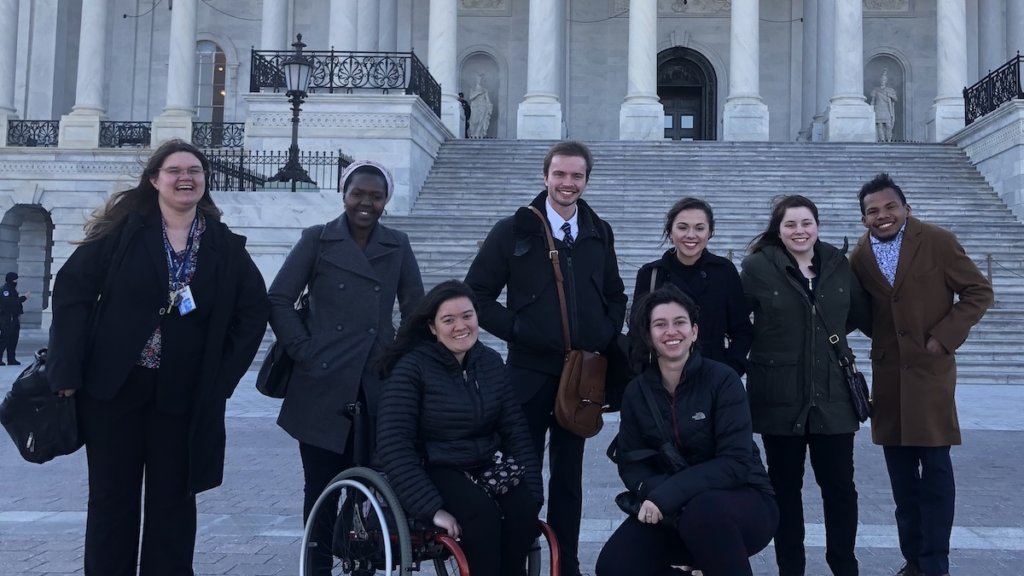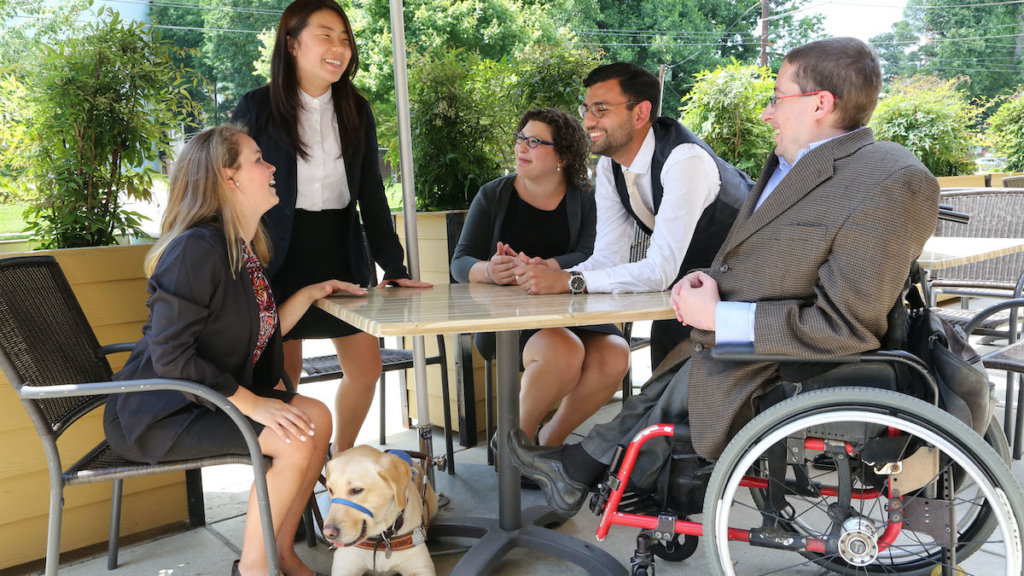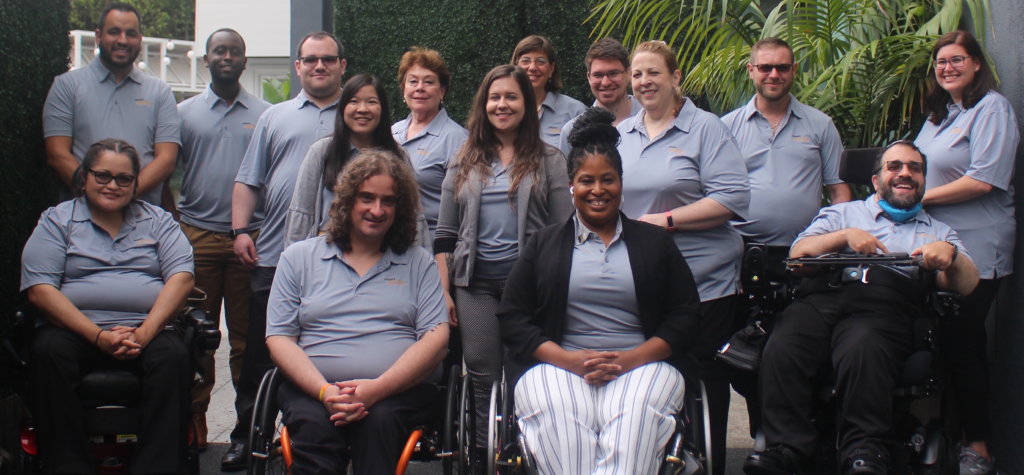Download the PDF or read each section of RespectAbility’s 2021-2026 Strategic Plan by following the links below:
- Executive Summary
- Current State and Historical Context
- Theory of Change
- RespectAbility’s Core Tenets
- Program Summary
- Organization Structure, Staffing, and Culture
- Leadership Development and Succession
- Financial Plan
Executive Summary
MISSION AND VALUE PROPOSITION
RespectAbility’s mission is to fight stigmas and advance opportunities so people with disabilities can fully participate in all aspects of community. RespectAbility is a diverse, disability-led nonprofit that works to create systemic change in how society views and values people with disabilities, and that advances policies and practices that empower people with disabilities to have a better future.
STRENGTHENING CURRENT PROGRAM FOCUS AREAS
RespectAbility knows that most people with disabilities can and want to fully participate in – and contribute to – all aspects of society. RespectAbility shifts narratives and creates progress by centering people with lived disability experience in leadership roles, ensuring authentic representation in entertainment and news media, advancing successful public policy, and pushing for faith-based and other inclusion. The following are RespectAbility’s core programmatic areas, which we will deepen and expand over the life of this plan:
- Entertainment and News Media – Increase diverse and authentic representation of disabled people in media so people with disabilities are seen for what they can do, instead of what they cannot.
- Leadership – Enable diverse people with disabilities to participate fully in decision-making.
- Policy – Promote best practices in education, employment, entrepreneurship, civic engagement, and access.
- Faith Inclusion – Ensure the inclusion of people with disabilities in faith-based communities.
ADDITIONAL STRATEGIC PRIORITIES
The following are RespectAbility’s strategic priorities for the next several years:
- Continue to grow our Hollywood programming, while building out more capacity to renew and expand our efforts and influence in news organizations and other areas that dramatically impact public opinion.
- Identify opportunities to engage with educational policy to ensure better outcomes for students with disabilities, while transforming opportunities for high schoolers with disabilities to get the skills and opportunities they need to succeed.
- Expand stakeholder feedback and data collection about disability issues, and create greater transparency and accountability through demographic data disaggregation.
- Deepen our organizational culture and capacity to operationalize racial and other equity in an intersectional context internally, as well as deepen our bonds with other disability equity and opportunity agenda organizations.
- Grow and develop our staff’s capacity to improve our programmatic, fund development, and administrative position.
- Use this expanded capacity to build and strengthen a sustainable financial structure sufficient to support the mission laid out in this plan.
- Grow the National Leadership Program, our leadership development track targeting young adults.
- Advance disability inclusion and advocacy nationwide by creating opportunities for, and with, adults with disabilities through our burgeoning National Disability Speakers Bureau, Lab and other programs.
- Expand ongoing career coaching, mentoring, teamwork, networking, and other opportunities for alumni of our training programs so they have a lifetime of impact.
LEADERSHIP AND STAFF STRUCTURE
RespectAbility has largely been driven by a small group of individuals operating in an entrepreneurial structure. As our team has grown to add more employees and board members, we need a more structured and supportive environment. Through this planning effort, we have taken steps to clarify and document the changing responsibilities of key leaders, the role of governance, anticipated staff positions to be added as resources allow, the importance of succession planning, and our current and potential future organization chart.
BUILDING INTERNAL CAPACITY
Our planning work placed a significant emphasis on strengthening our organization and building internal capacity. A strong and highly functioning organization will be critical as a foundation for long-term sustainability, effectiveness, and most importantly, impact. The primary focus areas of this plan are the following:
- Strengthening sustainable and expanded financial capacity
- Expanding human resources, management capacity, and succession planning
- Advancing the Board governance functions
- Strengthening organizational culture, equity, and capacity to ensure that both internal and external members feel welcomed, respected, and valued.
APPROACH TO MANAGING AND UPDATING THIS PLAN
RespectAbility recognizes that we are in a period of change, and therefore will need to maintain flexibility and adapt quickly throughout the course of implementing this plan. As a result, this plan is intended to be a document that can be referenced frequently and updated at least annually. The annual updates will be made as part of the July meeting of RespectAbility’s Board of Directors. As our organization evolves and outside factors influence our revenue model and operating structure, we will reference this plan to respond to those changes and adapt quickly.
Current State and Historical Context
RespectAbility was established in 2013 for the purpose of empowering people with disabilities to achieve both inclusion and economic independence. In our inaugural business plan, RespectAbility envisioned distributing high-quality, nonpartisan research and tools to help business and policy decision-makers understand how individuals with disabilities can make a positive impact on the economy. Since our 2013 plan, RespectAbility has evolved and now advances our mission through a three-part strategy:
- Fighting stigmas by promoting diverse, authentic, and accurate portrayals of people with disabilities.
- Advancing opportunities by identifying and promoting best practices in education, employment, entrepreneurship, civic engagement, and access.
- Leadership development to strengthen a talent pipeline and participatory presence of diverse people with disabilities.
Given our growth and impact, we have reached a point in our development where we are ready to revisit our strategy and ensure that our organization is positioned to maximize our impact over the next five years. Furthermore, the COVID-19 pandemic has shifted the world to become virtual, which has added economic and educational pressure on those with disabilities. These events have heightened the need for RespectAbility to clarify our value proposition.
A current state assessment, facilitated by external parties, helped elevate the following conclusions about our organization:
- RespectAbility’s mission is unique. No other organization does what we do in the way we do it.
- RespectAbility is well known and respected for our policy work and Hollywood programming. We can now expand our industry-funded model for entertainment media.
- Opportunity exists to leverage our Hollywood playbook to address other industries such as the news media.
- There is a need for training services on disability inclusion and access.
- We have an opportunity to collaborate and work with organizations at the intersection of disability, racial and other equity, access, and employment. Being a good collaborator and sharing credit for advances made will help move us beyond previous missteps, real and perceived.
At a high level, the current state assessment did not suggest that we should fundamentally adjust our strategies or the foundations of our key programs. However, the assessment did suggest that there are opportunities for RespectAbility to deepen the strength of our existing programs through investment and collaboration with other organizations.
These insights have shaped RespectAbility’s theory of change and the corresponding program strategies found throughout this plan.
Theory of Change
The following represents RespectAbility’s theory of change, capturing how our core programmatic activities intersect to drive long-term impact.
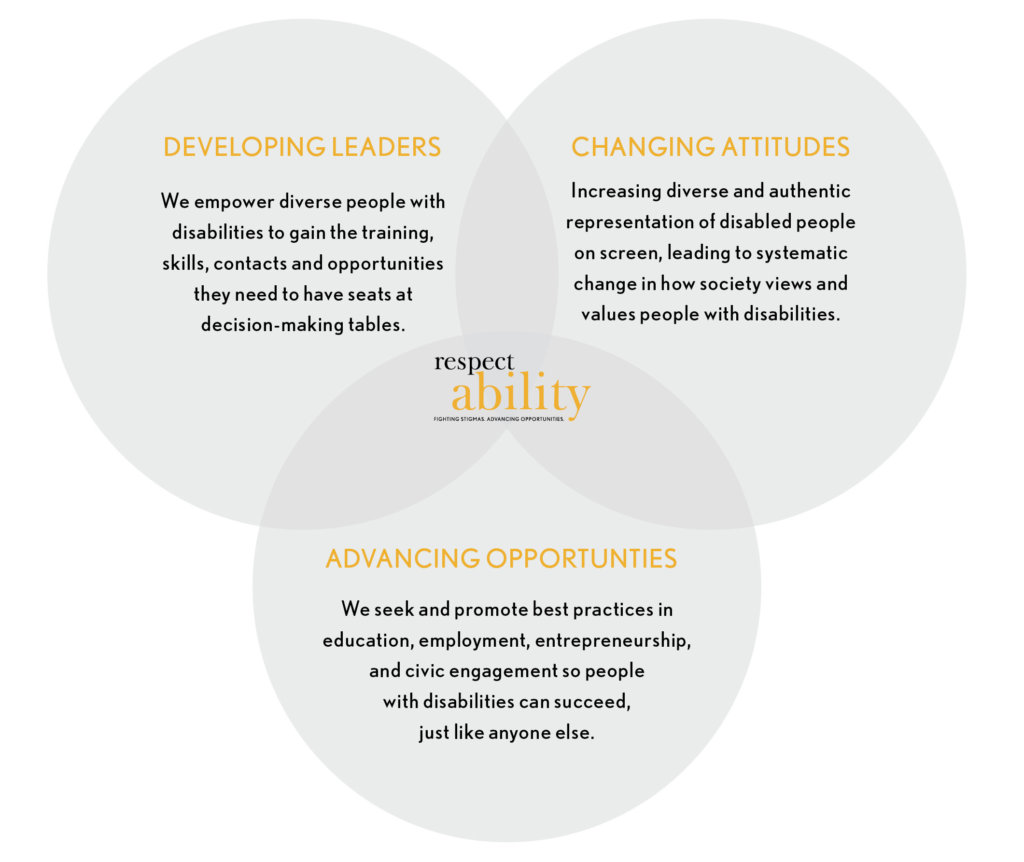
MISSON: RespectAbility fights stigmas and advances opportunities so people with disabilities can fully participate in all aspects of community.
DEVELOPING LEADERS: We empower diverse people with disabilities to gain the training, skills, contacts and opportunities they need to have seats at decision-making tables.
CHANGING ATTITUDES: Increasing diverse and authentic representation of disabled people on screen, leading to systematic change in how society views and values people with disabilities.
ADVANCING OPPORTUNITIES: We seek and promote best practices in education, employment, entrepreneurship, and civic engagement so people with disabilities can succeed, just like anyone else.
RespectAbility’s Core Tenets
RespectAbility has developed three core tenets that guide our theory of change and underlying programs. These tenets are intended to provide focus and direction and serve as a constant reminder of how RespectAbility will implement our plan. While not all these tenets are specifically called out in the subsequent program summaries, we expect and assume that the Board and Staff members will weave these tenets into how we develop our programs, serve individuals with disabilities, and collaborate inside and outside of our organization.
Tenet 1: Diversity, Equity, Inclusion and Accessibility
RespectAbility is against all forms of discrimination, including racism, ableism, sexism, ageism, homophobia, transphobia, xenophobia, anti-Semitism, and prejudice of all kinds. Our work strives to be deeply inclusive of all people with disabilities and allies, with a specific emphasis on those who face intersectional barriers to equity. We recognize the importance of going beyond transactional diversity initiatives to transformational societal and organizational change that drive measurable improvements to access and equity. We are working to build an organization and contribute to communities where lived experiences of those with historically marginalized identities are centered, valued, respected, included, and not tokenized.
Tenet 2: Collaboration
Our work should be done in a collaborative fashion that stays true to our values and goals. We recognize that RespectAbility is building upon a strong foundation laid by other disability, equity, workforce, nonprofit, faith and policy leaders, as well as community-led organizations. Many of these organizations are our partners and RespectAbility will make concerted efforts to strengthen our bonds and coordinate our efforts with these organizations, learning from each other and sharing credit for successes yet to come.
Tenet 3: Commitment to Performance Metrics
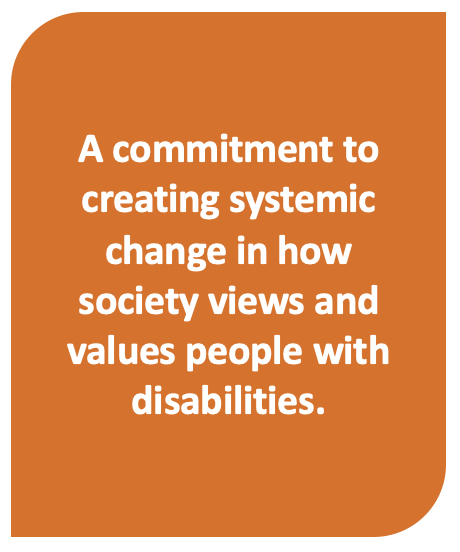 Our work becomes more impactful when we, and our collaborators, ensure that metrics include and track disability status. It is impossible to track progress and impact longitudinally without comprehensive and consistent data. We will support this commitment by working with public, private, nonprofit, and faith-based sector leaders to ensure that these institutions track and disaggregate data elements with respect to disability status, gender, race, and sexual orientation. Where data is not presently collected, we will encourage these institutions to modify their data collection processes to be more inclusive of these communities. Data should be leveraged to call attention to disparities and drive positive change. We also will measure the efficacy of our own programs and provide learnings for continued strategy adjustments and development.
Our work becomes more impactful when we, and our collaborators, ensure that metrics include and track disability status. It is impossible to track progress and impact longitudinally without comprehensive and consistent data. We will support this commitment by working with public, private, nonprofit, and faith-based sector leaders to ensure that these institutions track and disaggregate data elements with respect to disability status, gender, race, and sexual orientation. Where data is not presently collected, we will encourage these institutions to modify their data collection processes to be more inclusive of these communities. Data should be leveraged to call attention to disparities and drive positive change. We also will measure the efficacy of our own programs and provide learnings for continued strategy adjustments and development.
Program Summary
This section summarizes RespectAbility’s program structure and describes how we contribute to each core area of programming.
RespectAbility organizes our program efforts into four areas:
| Program Area | Purpose |
| Policy & Practices | Create access, advance opportunities, and break down barriers to education, employment, entrepreneurship, and civic engagement for diverse people with disabilities. |
| Entertainment & News Media | Create equitable and accessible opportunities to increase the number of people with lived disability experience throughout the entire media ecosystem, which increases diverse and authentic representation of disabled people on screen, thus leading to systemic change enabling people with disabilities to be seen for what they CAN do, instead of what they cannot do. Ensure that these changes are reflected not only in entertainment, but in the way that other forms of media, especially digital and television news, portray people with disabilities. |
| Leadership Development | Help diverse people with disabilities acquire the training, skills, contacts, and opportunities they need to have a seat at decision-making tables. Increase awareness and opportunity by speaking on disability inclusion and advocacy. |
| Faith Inclusion | Deepen and build upon the organization’s strong history of working with the Jewish community. We will equip individuals with disabilities, the faith organizational ecosystem, and other faith-based organizations with the capacity to ensure that individuals with disabilities can participate and contribute to all aspects of religious life. |
The following outlines each program, its purpose, goals, and outcomes, as well as the underlying activities that will help the program reach its goals.
POLICY & PRACTICES PROGRAM
Overview and Purpose Statement: RespectAbility recognizes that our nation is at its best when all people, including people with disabilities, can get the skills, jobs, and opportunities they need to succeed. Our program uses a bipartisan, best practice-based approach to drive policy and practices changes. We advance a system change agenda that creates access and breaks down barriers to education, employment, entrepreneurship, and civic engagement for diverse people with disabilities. By working in coalition with stakeholders and partners at the federal, state, and local level, and engaging the grassroots, we will advance opportunities for people with disabilities to earn an income, contribute to society, and achieve independence, just like anyone else.
Our innovative work, coalition building, and resources will advance best practices to ensure that diverse people with disabilities have the skills, economic opportunities, supports, accommodations, and inclusion they need and deserve to both thrive individually and make their communities stronger. The work will include our continued commitment to collaboration with other organizations, including BIPOC and English Language Learner (ELL)-led groups, working in the policy space. As part of this, we will ensure our statistics and advocacy materials highlight the disproportionate impact on BIPOC and ELL students with disabilities and work to advance policies that will drive equity in accessing the skills and opportunities needed to succeed. We will also train individuals with disabilities about the policies relevant to them and equip them to advocate on their own behalf.
Policy Goals and Performance Metrics: The following are the key goals and metrics of the Policy program:
| GOALS | PERFOMANCE METRICS |
| Achieve parity for people with and without disabilities in relevant measures for working-age people residing in the U.S. from all backgrounds. |
|
| The public benefits system will no longer disincentivize work and punish people with disabilities who have more than $2,000 to their name to be able to earn a living wage. |
|
| Ensure a comprehensive network of support systems to equip people with disabilities to start their own disability-owned business enterprise (DOBE), earn certification as a DOBE, access credit, and succeed as entrepreneurs. |
|
Current Policy Activities: Below are RespectAbility’s current programs. These are expected to continue during the life of this plan.
| CURRENT PROGRAM ACTIVITY | PERFORMANCE METRICS |
| Candidate Engagement & Non-Partisan Voter Guides | Educate candidates for elected office about the issues facing people with disabilities, as well as how and why to include both accessibility for all and people with disabilities in their work and teams. Educate voters about their choices through the development, distribution, and publication of nonpartisan disability voter guides. |
| Educate Policymakers on Advancing Opportunities for People with Disabilities | Advocate for federal, state, and local policies that will drive policy and practices change, and advance opportunities for people with disabilities who want to work. |
| Educate Leaders on Best Practices in Employment for People with Disabilities | Advocate for leaders in nonprofits, public service, and the private sector to adopt and implement best practices that advance the recruitment, hiring, and retention of employees with disabilities. |
Future Policy Activities: Below are future activities we will develop during the life of this plan.
| FUTURE PROGRAM ACTIVITY | DESCRIPTION |
| Education Policy | RespectAbility will emphasize policies that impact transition-aged youth with disabilities. Working in a nonpartisan fashion, the policy team will collaborate with any and all partners, including government, nonprofit, educational groups, and people with disabilities. We will develop and implement policy structures that will provide free and appropriate education to any student who seeks it, while ensuring that those who choose to seek education privately are also appropriately supported. This will include a specific focus on the current achievement gaps for students with disabilities, and crafting both policies and resources to ensure that these gaps, especially gaps which specifically or disproportionately affect BIPOC/ELL students with disabilities, are addressed. |
| Civic Engagement |
|
| State-Level Coalition Building | RespectAbility will work with existing and new allies at the state level to build coalitions to expand positive change. These coalitions will help us identify barriers for individuals with disabilities, which would be known to someone living in that state but not externally. They will also provide local knowledge and help to identify and advocate for solutions. |
ENTERTAINMENT AND NEWS MEDIA PROGRAM
Overview and Purpose Statement: Led by diverse people with disabilities, RespectAbility’s Entertainment and News Media Team partners with studios, production companies, writers’ rooms and news organizations to create equitable and accessible opportunities to increase the number of people with lived disability experience in positions of authority throughout the creative and news media industries. We have conducted trainings for and consulted on projects with A&E, Bunim-Murray Productions, CAA, NBCUniversal, Netflix, Sony Pictures Entertainment, ViacomCBS, The Walt Disney Company and others. These initiatives, including our award-winning Lab, increase diverse and authentic representation of disabled people on screen, leading to systemic change in how society views and values people with disabilities. This, in turn, will enable people with disabilities to receive the education, jobs, access, and opportunities they need to be as independent as possible.
Entertainment and News Media Goals and Performance Metrics: The following are the key goals and metrics of the Entertainment and News Media program:
| GOALS | PERFORMANCE METRICS |
| Measure and change public opinion so society values people with disabilities equally in all areas, including employment, education, and healthcare. |
|
| Create equitable and accessible opportunities to increase the number of people with lived disability experience in positions of authority throughout the overall storytelling process of both entertainment and news medias.
|
|
| Ensure our work garners a reputation in which people in the studio system get hired from the Lab because the RespectAbility program means something significant to them. |
|
Current Entertainment and News Media Activities: Below are RespectAbility’s current programs. These are expected to continue during the life of this plan.
| CURRENT PROGRAM ACTIVITY | DESCRIPTION |
|
Public Opinion Research and Stakeholder Feedback |
Conduct regular one-on-one interviews, focus groups, and surveys to understand, move, and track public opinion in the U.S. about the competency of people with disabilities. Ongoing feedback loops from program participants and stakeholders. |
| Studio Training and Hiring Initiatives | Conduct diverse disability-related trainings, including Disability 101 and specialized trainings for casting, marketing, creative, production, and HR executives, as well as otherers by request. |
| Consulting Services | RespectAbility has already consulted on more than 200+ episodes / films. These services include partnering with studios and productions from development all the way through production, promotion/publicity, and impact/outreach campaigns, often from the very early stages of a writers’ room, in addition to ad hoc requests. The most common requests include sensitivity reads and script development, casting and talent consultations, creating reference videos for animators, reviewing animatics and rough cuts of live-action content throughout the production process. Facilitate connections with people with specific lived disability experiences and serving as a liaison and collaborator with experts, writers, and creative executives. |
| Lab Program for Entertainment Professionals with Disabilities | Help develop and elevate the talent pipeline of professionals with disabilities working behind-the-scenes in television and film. These seminars allow participants and speakers from across the industry to network and learn from one another, opening doors to studio executives. |
Future Entertainment and News Media Activities: Below are future activities we will develop during the life of this plan. Note some of these are expansions of current programming.
| FUTURE PROGRAM ACTIVITY | DESCRIPTION |
| Studio Training and Hiring Initiatives – Expanded |
|
| Consulting Services – Expanded |
|
| Lab Program for Entertainment Professionals with Disabilities – Expanded |
|
| Film and Journalism Schools |
|
LEADERSHIP DEVELOPMENT PROGRAM
Overview and Purpose Statement: Within the next five years, RespectAbility envisions becoming the premiere go-to cross-disability national leadership organization. We will be known for creating a premium talent pipeline and for cultivating the talents, skills, competencies, energy, and innovative spirt of emerging leaders with disabilities from all backgrounds. These individuals will demonstrate and share in their commitment to fighting stigmas and advancing opportunities for, and alongside, people with disabilities. Disabled BIPOC leaders will have roles in every aspect of our work, and we will continue to expand and deepen our cultural competency and commitment to equity of all kinds (58% of students with disabilities in America’s public schools are BIPOC). This is also the case with the LGBTQ+ community, as according to the CDC, members of the LGBTQ+ community are disproportionately members of the disability community and vice versa.
Through a series of leadership development initiatives that may begin as early as high school, RespectAbility will expose persons with disabilities to a variety of intersectional, multigenerational, and cross-partisan experiences designed to develop a deep understanding of the disability rights movement’s history, assess opportunities to impact career and community, foster professional networking opportunities through difference-making projects, and help these individuals attain upwardly-mobile positions in the nonprofit, for-profit, and governmental sectors.
Should this program prove successful, future leaders with disabilities should have a decision-making role in their chosen career path at any and every level. Simultaneously, society at large will see people with disabilities as capable leaders, key contributors, and highly valued.
Leadership Development Goals and Performance Metrics: The following are the key goals and metrics of the Leadership Development program:
| GOALS | PERFORMANCE METRICS |
| Recruit, cultivate and help place diverse and talented people with disabilities into leadership roles.
Train and place talented people with disabilities to lead disability inclusion training for other groups. |
|
| Train key partners that can impact disability portrayal, inclusion, employment, and power, as well as implement policies to be accessible to, and inclusive of, diverse people with disabilities. |
|
| Train, prepare, and deploy diverse people with disabilities to be at decision-making tables for every aspect that can impact the quality of life for people with and without disabilities. This should lead to institutions being fully accessible to, and inclusive of, people with disabilities. |
|
Current Leadership Development Activities: Below are RespectAbility’s current programs. These are expected to continue during the life of this plan.
| PROGRAM ACTIVITY | DESCRIPTION |
| National Leadership Program | Train leaders who are committed to disability issues and plan to go into careers in advocacy, the nonprofit sector, philanthropy, faith-based and other sectors. Specific areas include Public Policy/Employment; Communications/Diversity in Film & Television; Nonprofit Management/Development; Community Outreach; Jewish and Faith Inclusion. Specific emphasis on people with intersectional experiences from BIPOC, LGBTQ+, ELL communities who have lived disability experience. |
| National Disability Speakers Bureau | Ensure that diverse people with disabilities can offer skills, training, and lived experiences to organizations and corporations (“clients”) so we can advance disability access, inclusion, and success. Tailor presentations such that the clients’ goals are met while advancing disability inclusion and equity. |
Future Leadership Development Activities: Below are future activities we will develop during the life of this plan. Note some of these are expansions of current programming.
| PROGRAM ACTIVITY | DESCRIPTION |
| National Leadership Program – Expanded |
|
| National Disability Training Bureau (NDTB) | Moving beyond the current concepts of Divisions, and even the primary focus on speakers, the current Speakers Bureau will evolve into a Training Bureau, primarily supported by fee-for-service, deploying talented individuals with disabilities to substantially move best practices at client organizations, who will evaluate precisely because they pay for it. This involves thoughtful recruitment, onboarding, training, and coaching of qualified, dynamic, and diverse speakers with disabilities and intersectional identities, who are prepared and willing to deliver high-level, actionable content to their audiences. The specific focus will be on candidates whom we feel can significantly advance disability inclusion, access, and impact. |
| Rising Leaders Fellowship Council | Develop a program for graduating Fellows. The Council can play a decision-making role in RespectAbility’s influential projects, with the primary purpose of turning our alumni into an engaged community supporting our work in pushing for change and greater inclusion in the world. While all our alumni will be advocates, these are the alumni with whom we envision a long-term strategic interaction. |
| High School Leadership Program | Create a program that possesses elements of training, networking, and mentorship from political and other leaders with disabilities, with the goal of engaging young people with disabilities in advocacy, both through increased knowledge and through a confidence in their own potential impact. |
| Nonpartisan Campaign Training for Candidates and Activists with Disabilities | RespectAbility will recruit and train diverse people with disabilities to run for office and/or help on political and issue advocacy campaigns. We will also encourage people to shadow elected officials to learn about how to best participate in campaigns. We will do civic engagement work to support policies that will achieve our goals. RespectAbility will not endorse or support candidates or campaigns and will stay nonpartisan. This will include introducing these potential candidates and volunteers to current political influencers. |
| Offer Lifetime of Leadership & Impact Opportunities | Ongoing mentoring, career services, networking, and other offerings to enable alumni of our leadership programs (Fellowship, Lab, Speakers Bureau, etc.) to have a lifetime of impact. |
FAITH INCLUSION PROGRAM
Overview and Purpose Statement: RespectAbility’s Faith Inclusion efforts work to create a model for religions, as faith and faith-based organizations are important parts of the fabric of many lives. Our model will deepen and grow out of our long-time focus on the Jewish community, where we work to equip Jews with disabilities and Jewish organizations with the capacity to ensure that interested Jews can participate in and contribute to all aspects of Jewish life and organizations. We believe that RespectAbility’s model and resources can contribute to best practices for all faiths and support faith communities as they support full participation and leadership opportunities for people with disabilities.
RespectAbility presently works in partnerships with established organizations and with change makers to build disability inclusion.
Faith Inclusion Goals and Performance Metrics: The following are the key goals and metrics of the Jewish Inclusion program:
| GOALS | PERFORMANCE METRICS |
| Widespread use of RespectAbility’s resources throughout the Jewish world, with a clear plan for duplication and adaptation to other faith-based initiatives. |
|
| Jewish Speakers from our National Disability Training Bureau will be broadly utilized at Jewish conferences and organizations and will be recognized for their leadership potential. |
|
| Jews with disabilities and their loved ones will be included in Jewish life and communities and an integral part of the fabric of all aspects of Jewish community leadership. |
|
| Major Jewish organizations will join with RespectAbility in a community of practice and innovation (COPI) centralizing Jewish inclusion practices and training. |
|
Current Faith Inclusion Activities: Below are RespectAbility’s current programs. These are expected to continue during the life of this plan.
| PROGRAM ACTIVITY | DESCRIPTION |
| One-Stop Shop for Disability Inclusion Solutions | RespectAbility offers timely answers to Jewish and other faith organizations and individuals on how to welcome, serve, and include people with disabilities. We also host Jewish inclusion online resources, with everything from informative webinars on religious topics to “how to’s” for accessible streaming of services. |
| Jewish Speakers and Trainers | Provides Jewish speakers with disabilities opportunities to present and speak on inclusion of people with disabilities at synagogues, webinars, and conferences. |
| Jewish Disability Perspectives Newsletter | A weekly newsletter that fosters important perspectives and practices in Jewish inclusion and helps promote our work. |
| Jewish Inclusion Fellows | A Jewish component to our National Leadership program. This program trains the next generation of Jewish leaders with disabilities to advance inclusion in the Jewish community and other faith-based communities. |
Future Faith Inclusion Activities: Below are future activities we will develop during the life of this plan.
| PROGRAM ACTIVITY | DESCRIPTION |
| Inclusion of faith-specific signs for users of American Sign Language (ASL) | We are working to create Jewish specific signs for users of ASL to enable communal prayer, which is often held in Hebrew. |
| Create a Virtual One-Stop Shop for Disability Inclusion Solutions | We will provide timely answers to Jewish organizations and individuals, from local synagogues and the movements of Judaism as well as the wide range of Jewish groups, on how to welcome, serve, and include people with disabilities. These answers could be through RespectAbility or referrals to or from our Community of Practice and Innovation (COPI). We also will involve Jews with Disabilities as subject matter expert consultants deployed internally and externally. For example, we will promote technological advances such as instant automatic captioning and screen-reader technology, while also providing support and technical assistance to inclusion committees and efforts in synagogues, JCCs, service agencies, Hillels, etc. We will send individuals with disabilities to help in implementation. |
| Identify & Develop Best Practices that Can be Replicated and Provide Needed Training | RespectAbility will lead in developing and sharing inclusion best practices, facilitating improvements as needed. We will prepare and deploy Jews with disabilities to train organizations and Jewish inclusion professionals on these practices. We will provide a rubric for organizations to evaluate their own inclusivity. These will embrace different intersectionalities. |
| Coordinate and Copromote Events Within the COPI | Every year, Jewish organizations create fantastic programming around disability inclusion that has a fraction of its potential impact. This is because some interested Jews never learn about events and scheduling conflicts around special days and months force some individuals to choose one program or the other. We will coordinate with other organizations and copromote events for maximum impact. |
| Build a Collective Advocacy Community | Promote inclusive and accessible advocacy by linking joint constituencies, enabling the Jewish community to raise a collective voice in the pursuit of the best policy outcomes for Jews and others with disabilities. We will advocate on issues such as disability-specific elements of poverty, employment, education, and others. |
| Train the Next Generation of Leaders and Speakers | In today’s world, Jewish disability inclusion is championed by a committed but small group of individuals with disabilities and their allies. For disability inclusion to truly become part of the fabric of the Jewish world, Jews with disabilities need to be on Jewish communal agency boards and be part of organizational staff and leadership. Through a combination of supervised work, an expanded Fellowship program, training, externships with partner organizations, and an expanded Jewish Speakers Bureau, the Initiative will prepare new organizational and thought leaders who will take this mission to new heights by incorporating experience and expertise into Jewish organizations. |
| Create a Sustainable Systemic Funding Model and Grants for Accessibly to Jewish Groups | We will create a new model for building disability inclusion into the funding of Jewish projects, agencies, and proposals, rather than being separate funding efforts. We also will build a $100,000 per year fund to provide matching grants to organization seeking to pay for accessibility and training. |
| Partner with multiple faith communities | Working with thought leaders including Professor Erik Carter, Rev. Bill Gaventa, and others, we will learn from their best practices and share what we have learned so that we can help each other advance disability access and inclusion. |
Organization Structure, Staffing, and Culture
During this strategic planning process, RespectAbility assessed its leadership, staffing structure, and resource needs for growth and succession planning. RespectAbility plans to aggressively build out its organizational structure in keeping with the growth and goals outlined in the strategic plan. To best understand where RespectAbility anticipates staffing growth, it’s important to first understand the organization’s current structure.
Current Organizational Structure
RespectAbility is currently organized into four program departments: Entertainment, News Media, and Comms; Policy; Leadership Development; and Faith Inclusion; as well as two support departments: Management (MGMT) and Development (Dev). Management consists of RespectAbility’s leadership and operational teams and Development supports the organization’s fundraising efforts. See the 2021 functional organization chart below. While RespectAbility does employ consultants to support these functional areas, here we focus on the number of Full Time Equivalent (FTE) employees supporting each department. At present RespectAbility employs a total of 16 FTE across its seven departments, supplemented by 7 paid Fellows and several consultants.
 Future Organizational Structure
Future Organizational Structure
To deliver on the goals outlined in this strategic plan, RespectAbility plans to make a few changes to its organizational structure:
- Communications: This will become its own department. In the current organizational structure, Communication FTEs are included in Entertainment. However, as RespectAbility begins engaging more intentionally with news and media outlets, leadership believes it makes sense to organize and track these employees and expenditures separately.
- Added FTEs: RespectAbility envisions growing significantly during the life of this plan and anticipates 43 full-time employees by 2026, as illustrated below. To determine the required number of FTEs, RespectAbility evaluated the each of the individual goals listed in the strategic plan and identified how many additional employees would be necessary to meet that goal. For example, new program areas in civic engagement, education/skills building policy and youth leadership will require new capabilities.
- Fellows have shifted from a pure leadership program to an “earn while you learn” virtual apprenticeship program: Recruiting, training, and placing these Fellows into jobs takes considerable Staff resources.

When the 2021 FTE count is compared to the anticipated 2026 FTE count, the following staffing changes emerge, illustrating expected growth by program area and supporting operational infrastructure:
| Department | 2021 Totals | 2026 Totals (est.) | Net Change |
| Entertainment | 3.25 | 9 | +5.75 |
| Policy | 2.75 | 7 | +4.25 |
| Leadership | 2.25 | 6 | +3.75 |
| Faith Inclusion | 1.25 | 4 | +2.75 |
| Comms | 1.5 | 5 | +3.5 |
| MGMT | 2.5 | 5.5 | +3 |
| Dev | 2.5 | 6.5 | +4 |
| Total | 16 | 43 | +27 |
Key considerations when reviewing organizational changes:
- RespectAbility will prioritize growing its development and marketing staff in the first year of the strategic plan. This is an effort to raise the funds necessary to hire the positions within the program areas. There are high expectations for production from this team and many unique qualities of fundraising and grant-writing in the disability space. Furthermore, this is a highly competitive segment of the job market, so competition for new hires may be fierce. Early efforts will require more outside fundraising consultants, whereas over time we want to focus on more in-house staff.
- If RespectAbility is unable to raise the funds, leadership will not hire the proposed staffing. This will require the professional leadership team to continually evaluate its priorities and allocate resources accordingly. As RespectAbility identifies growth opportunities and/or receives funding, it will make choices about how to target employee sourcing efforts as well as where to focus internal skill and team building, as well as upskilling.
- RespectAbility will use concepts such as core competencies to guide the assessment and development of its employees. The organization will continue and build its support and development of staff in people or functional management roles.
- RespectAbility will define and promote its strategy of seeking diverse candidates for hire, fellowships, and consultant opportunities, and offer a supportive workplace that enables learning and skill development while performing impactful work.
- The influx of talent and expansion described above will require consistent, objective analysis of skill and competencies needed, assessment of essential functions and task assignments, and continuing analysis of efficiency. While redundancies are expected as new staff are onboarded and trained, clarification of who is responsible for what, who reports to whom, and how time/support resources can be shifted in response to challenges is part of effective implementation.
- As this plan is implemented, understanding the skill profile of the Board, executive team, senior managers, and middle managers will be essential. RespectAbility’s current leadership profile is characterized by enormous commitment, passion, and core competencies for each role. We also prioritize talent with lived disability experience as people with disabilities know the problems and solutions that work best for our community. For the organization’s next phase, each key role will need to be assessed for its required skill profile and the incumbent (or prospective hires) match, strengths, and opportunities.
- During the pandemic RespectAbility gave up its lease to its national headquarters and went largely virtual. As the organization has grown, the plurality of staff is now in Los Angeles, where RespectAbility has a small office. However, the organization is quite national in scope, with Staff, Board Members, Fellows and Lab participants across the country. RespectAbility has already resumed in-person events and may revisit virtual v. in-person work and hybrid events in the future.
Organizational Culture
RespectAbility recently completed two (2) employee surveys to gather feedback on its organizational culture. The surveys were meant to gather honest feedback as well as strengthen teamwork and trust among Staff and the Board. RespectAbility felt compelled to complete the surveys given the organization’s rapid growth during COVID and our commitment to equity. This growth during the pandemic has created an environment where many of the staff members have not met in-person. As a result of the surveys RespectAbility has identified a few goals as it relates to its organizational culture:
- RespectAbility’s organizational culture will be clearly defined, visible to internal and external stakeholders, and ranked high in employee engagement surveys. To support this effort, RespectAbility will not only begin defining its organizational culture goals (e.g. employee satisfaction metrics), but it will also define one method and cadence for implementing a multi-year employee engagement survey.
- RespectAbility will have a strong internal and external reputation for diversity, equity, inclusion, and access (DEIA). The organization will engage Staff, Fellows, and Board members in an internal values evaluation exercise and seek opportunities to refer to these values in job descriptions and performance reviews.
- Given the virtual nature of our teams, RespectAbility will have to be very intentional to build a sense of community throughout the organization. An in-person Staff retreat took place in July of 2021, concurrent to our board retreat, so that our full teams could build upon our trust, impact, and collaboration.
RespectAbility recognizes the importance of creating a positive, strong, and effectively managed organizational culture. As the results of the survey are analyzed, RespectAbility looks forward to working with Staff to implement the recommendations.
Leadership Development and Succession
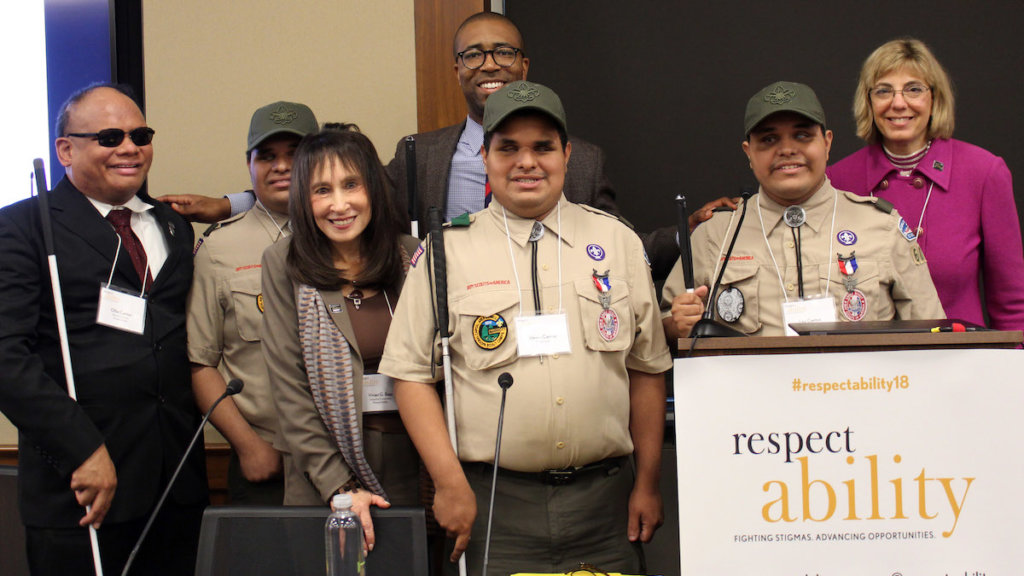
RespectAbility Chairman Ollie Cantos with his triplet sons who are Eagle Scouts, along with RespectAbility Vice Chair Vivian Bass, Chair Emeritus Calvin Harris, and CEO Jennifer Laszlo Mizrahi
President and CEO Succession Plan
As part of the strategic planning process and response to outcomes from the board’s June 2020 self-assessment, RespectAbility drafted a succession plan to ensure that the organization’s leadership has adequate information to effectively manage RespectAbility in the event the President and CEO is unable to fulfill their duties. This plan, which lives in detail as a companion piece to this strategic plan, would activate in the event of an unexpected President and CEO departure or gap.
There are a few key components within the plan worth highlighting here:
1) A Succession Plan in the event of a temporary, unplanned President and CEO absence: A temporary absence is one of less than three months in which it is expected that the President and CEO will return to his or her position once the events precipitating the absence are resolved. An unplanned absence is one that arises unexpectedly, in contrast to a planned leave, such as a vacation or a sabbatical. The Board of Directors is authorized (or will authorize the Executive Committee) of RespectAbility to implement the terms of the emergency plan in the event of the unplanned absence of the President and CEO. In the event of an unplanned absence of the President and CEO, the President and CEO (or Director of Finance and Administration if the President and CEO is unable to) is to immediately inform the Board Chair of the absence. As soon as it is feasible, the Chair should inform the Board of Directors and convene a meeting of the Executive Committee to affirm the procedures prescribed in the plan or to make modifications as the Committee deems appropriate. The plan includes further guidance regarding authority and compensation of the acting President and CEO, board oversight responsibilities, internal and external communications, and return-to-work matters.
2) A Succession Plan in the event of a permanent planned or unplanned President and CEO departure: A permanent change is one in which it is firmly determined that the President and CEO is either leaving or will not be returning to the position following an unplanned departure. The plan includes guidance regarding a transition committee, interim leadership, board oversight responsibilities, search and hire process, and post-hire expectations.
3) Instructions on how frequently the plan must be approved and how it is maintained by the board: The President and CEO succession plan will be approved initially by the RespectAbility Board of Directors as an implementation step of this strategic plan. Thereafter, the Executive Committee shall review the plan and recommend amendments to the full Board as needed. The Board Chair, the President and CEO and any appointees designated in the plan shall sign the plan. Copies of the plan, once approved and signed, shall be maintained by all members of the Board of Directors and director level staff.
Board Development Plan
As part of the strategic planning process, RespectAbility conducted a self-assessment in June 2020 and considered the structure and policies of its board of directors. The assessment and subsequent deliberations were meant to lift up board development priorities to be addressed by the board during the lifetime of the strategic plan.
1) Board Structure: Directors, Advisory Members, and the Executive Committee: RespectAbility actively uses two governance bodies: a Board of Directors and an Advisory Council. Directors have fiduciary duties as outlined in RespectAbility’s bylaws, while the Council does not. Instead, the Council serves as a knowledge resource for Staff and Directors. This can cause confusion as Directors and the Council often vote together, even though technically Directors’ votes are the only ones that bind the organization. Furthermore, RespectAbility’s bylaws mention an Executive Committee. This Committee has never been used by RespectAbility. Due to the nuances of its governance structure, RespectAbility would like to create a working group during the life of the strategic plan to explore whether the Advisory Council should be merged into the Board of Directors and whether there is a need to activate an Executive Committee.
2) Board Fundraising Responsibilities: As part of the above working group, RespectAbility would like to explore the appropriateness and effectiveness of maintaining and enforcing fundraising requirements for its board members, presently prescribed in bylaws. It will also provide training and support to board members on how to raise funds in order for us to achieve our mission.
3) Board Committees: RespectAbility’s growth and goals mean that it can benefit from more a formalized board committee structure. In the near term, its board will create a committee structure that mirrors our goals around policy, media, leadership, faith inclusion, development, and finance.
4) Board Continuity: While the board does have a nomination committee, the current primary responsibility for identification and cultivation of future board members is almost entirely a Staff exercise. Recognizing that one of the great virtues of the board is the access to individuals and groups beyond that which the Staff can access, RespectAbility will cultivate greater Board participation in nominations.
Financial Plan
RespectAbility’s financial goals reflect the programmatic efforts described throughout this plan and call for growth with the priorities described above: Policy, Entertainment, Leadership Development, and Faith Inclusion. Underlying this growth is the organization’s commitment to maintain sufficient financial health, build unrestricted reserves, manage risk, and reinvest in the organization’s capacity and growth.
DIVERSIFYING REVENUE MIX
RespectAbility has set its sights on growing total revenue from $2.2 million in 2021 to $5.85 million in 2026. This growth largely depends on RespectAbility expanding and diversifying its revenue sources. Most notably, RespectAbility intends to build a revenue mix that includes more earned income, individual giving, and government grants. In 2021, almost all of RespectAbility’s revenue came from foundations, earned income, and individual giving.
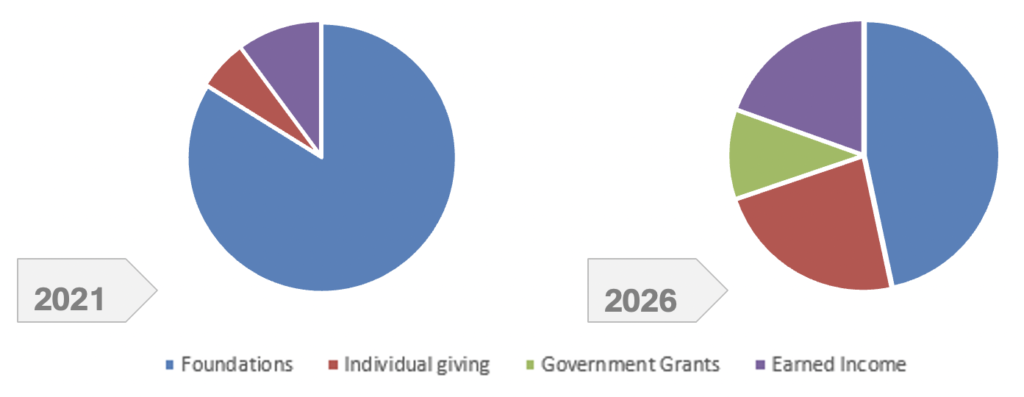
BALANCED PROGRAM MIX
RespectAbility plans to drive this diversification through an upfront investment in its fundraising and development team during the early years of this plan. This fundraising effort will allow RespectAbility to scale its programming and build the corresponding staffing outlined in the Organizational Structure section of this plan. Given that funder priorities can be fluid, RespectAbility envisions building a balanced program portfolio with Entertainment, Policy, and Leadership programs each consisting of 25% to 35% of RespectAbility’s total revenue. Faith Inclusion is anticipated to remain around 15% of RespectAbility’s total revenue.
DISTRIBUTION OF REVENUE
| 2021 | 2026 | |
| Entertainment | $970,000 | $2,000,000 |
| Policy | $537,000 | $1,620,000 |
| Leadership | $379,500 | $1,415,000 |
| Faith Inclusion | $314,000 | $815,000 |
| Total | $2,200,500 | $5,850,000 |
PERCENT OF TOTAL REVENUE
| 2021 | 2026 | |
| Entertainment | 44% | 34% |
| Policy | 24% | 28% |
| Leadership | 17% | 24% |
| Faith Inclusion | 14% | 14% |
| Total | 100% | 100% |
A COMMITMENT TO MISSION CRITICAL AND GROWTH EXPENSES
The most anticipated change in the organization’s expense structure is the creation of a standalone communications and marketing department. This department will be responsible for expanding the impact of our policy, leadership, and media work, lifting up positive role models of disability success, expanding our fee for service model, while also magnifying the success of RespectAbility and the broader disability community to various news and media outlets, as well as RespectAbility’s reputation. This department used to be embedded within Entertainment & News Media, but RespectAbility is making a strategic choice to separate it out to better reflect the fact that the Communications department will serve all program areas, not just Entertainment & Media. As noted below, RespectAbility plans to drive its expenditures towards activities that both support and amplify its programs.
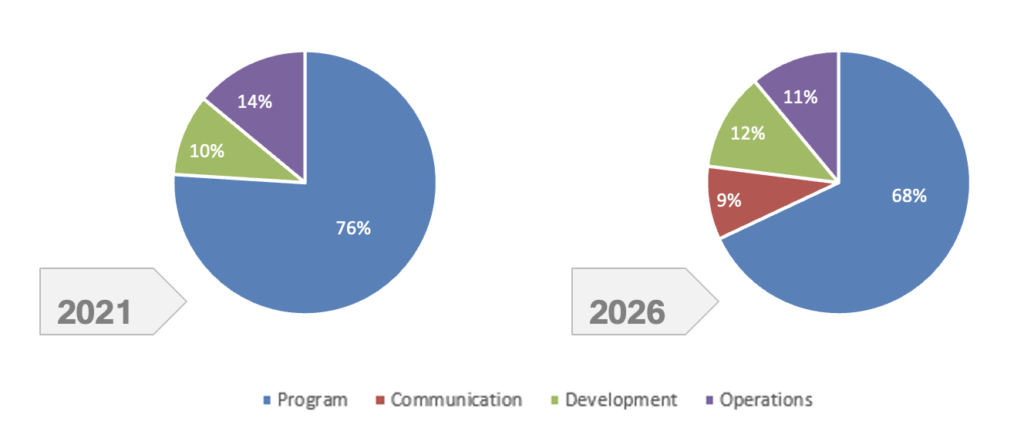
OVERALL PLAN FOR SUSTAINABLE GROWTH
RespectAbility sees an opportunity to build a pathway for each program area to be financially sustainable. This includes committing to pay salaries that are competitive with similar positions in relevant peer fields or industries. RespectAbility recognizes that presently some of its programs are subsidizing other programs. It is RespectAbility’s goal that each program will be self-sufficient and cover its direct program and administrative costs. As RespectAbility moves forward and implements the plan, the organization will identify opportunities to grow its program margins and reinvest back in the organization.
2026 FINANCIAL PROJECTIONS
RespectAbility will continue to monitor and update the financial projections each year as new budgets are formed and actual results are attained. As of the creation of this plan, the following shows RespectAbility’s projected 2026 financials:
| REVENUE | Entertainment | Policy | Leadership | Faith Inclusion | Total |
| Foundations – Grants | $400,000 | $1,134,000 | $707,500 | $489,000 | $2,730,500 |
| Individual Giving | 400,000 | 486,000 | 141,500 | 326,000 | 1,353,500 |
| Government Grants | 200,000 | – | 424,500 | – | 624,500 |
| Earned Income | 1,000,000 | – | 141,500 | – | 1,141,500 |
| Total Revenue | $2,000,000 | $1,620,000 | $1,415,000 | $815,000 | $5,850,000 |
| EXPENSES | Entertainment | Policy | Leadership | Faith Inclusion | Total |
| Salaries | $747,143 | $746,393 | $592,143 | $376,393 | $2,462,072 |
| Benefits | 147,033 | 146,778 | 96,036 | 78,509 | 468,357 |
| Consultants | 200,000 | – | 85,000 | 30,000 | 315,000 |
| Subtotal Direct Expenses | 1,094,176 | 893,171 | 773,179 | 484,902 | 3,245,429 |
| Other OpEx: (e.g. evaluation, supplies, IT) | 273,500 | 209,500 | 193,300 | 47,950 | 724,250 |
| Communication Expense | 182,250 | 148,770 | 128,783 | 80,767 | 540,569 |
| Development Expense | 241,470 | 197,111 | 170,630 | 107,011 | 716,222 |
| Operations Expense | 208,604 | 171,448 | 149,108 | 94,370 | 623,530 |
| Total Expenses | $2,000,000 | $1,620,000 | $1,415,000 | $815,000 | $5,850,000 |
| Total Net Surplus (Deficit) | $0 | $0 | $0 | $0 | $0 |
Consulting support for RespectAbility’s strategic plan was provided by CliftonLarsonAllen.

